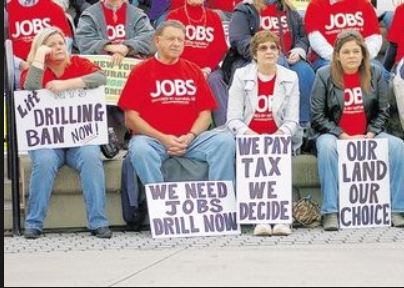Santa Barbara County, California, residents vote November 4 on Measure P, a ballot initiative to ban “fracking,” a drilling technique, there.
Sponsoring the initiative is a local environmentalist group, Santa Barbara County Water Guardians, but critics are warning it could have broad implications on the entire energy sector.
According to University of California-Santa Barbara Earth Sciences Professor Emeritus James Boles, Measure P reads as “a poorly designed measure that would shut down energy production in Santa Barbara County.”
An activist pushing the initiative recently said in a leaked email that the effort is part of a large push to ban fracking throughout the entire state.
Heather Goold, director for The Fund for Public Interest–a group connected, according to a new report from the GOP staff of the Environment And Public Works Committee, to Bill McKibben’s 350.org and billionaire environmentalist Tom Steyer (who recently met with Santa Barbara activists)–solicited UCSB students for “Summer Jobs to Ban Fracking.” Goold’s leaked email explained: “We’re working this summer to convince Governor Jerry Brown to ban fracking before it’s too late…. This summer we are hiring staff to talk to 30,000 Santa Barbara County residents to build the support we need to win. We are hiring for full time positions only (40 hrs/wk), M-F.”
Many cities and counties–mostly liberal communities with little or no drilling potential–have passed anti-fracking legislation, resolutions, and/or moratoriums. Environmentalists have cited those successes to build momentum for bans where fracking is actually occuring.
Colorado had two anti-oil-and-gas initiatives on November’s ballot, but the supporters agreed to pull them when it became clear the measures would drive Republicans to the polls and hurt troubled re-election chances for Senator Mark Udall and Governor John Hickenlooper.
Mora County, New Mexico, boldly passed a ban on all drilling for hydrocarbons, not just fracking. The move resulted in two lawsuits and fiscal liabilities against the county.
Environmentalists believe fracking should be a crime and want it banned, which would shut down 96 percent of all oil-and-gas drilling in the United States. Activists oppose the Keystone pipeline and lock themselves to the White House gates to highlight their message.
Because the average American understands that “drill here, drill now” results in lower prices at the pump–as we are seeing right now, the extremists use “fracking” as a canard when the real target is drilling. Capitalizing on the public’s lack of awareness about the safe-and-proven technology of hydraulic fracturing–or “fracking”–anti-fossil fuel activists have been able to give “fracking” their own definition that essentially covers everything from permitting to production to delivery.
We know President Obama has been waging a war on coal, with tens of thousands of jobs lost due to his attacks since his 2008 election. But why has the oil-and gas-industry escaped the harsh regulations that have virtually shut down both coal mining and coal-fueled power plants?
With an eye always on politics, President Obama can’t afford the negative job numbers a war on all fossil fuels would cause. His allies, less concerned about the political fallout and using a death-by-a-thousand-cuts approach, have been fighting oil and gas–as they’ve done with coal–in such counties as Santa Barbara and Mora.
“You are responsible for President Obama’s re-election,” I told 150 folks from the oil-and-gas industry, most of whom were conservative Republicans, last week. A reporter covering the San Angelo, Texas, event wrote that I “stunned the crowd by telling them they were largely responsible for getting the president re-elected, and asking them if they knew how they had helped.”
“The room was very quiet for several moments as Noon waited to see if anyone would volunteer an answer,” the reporter observed, adding, “Finally someone suggested it was job creation that Noon was alluding to.”
The oil-and-gas industry has added millions of jobs to the U.S. economy in the past six years and represents the bright spot in jobs numbers. Where would the unemployment numbers–or President Obama, for that matter–be if the oil-and-gas industry had been treated as poorly as coal?
If Measure P passes on November 4–giving the environmentalists another win and the economy another loss–well-paid jobs in the oil industry will go away and surrounding communities will suffer (similar to the impact felt in coal). A vote against Measure P sends a sunny signal on jobs that may go beyond sunny Santa Barbara.
The author of Energy Freedom, Marita Noon serves as the executive director for Energy Makes America Great Inc. and the companion educational organization, the Citizens’ Alliance for Responsible Energy (CARE). She hosts a weekly radio program: America’s Voice for Energy–which expands on the content of her weekly column.

COMMENTS
Please let us know if you're having issues with commenting.